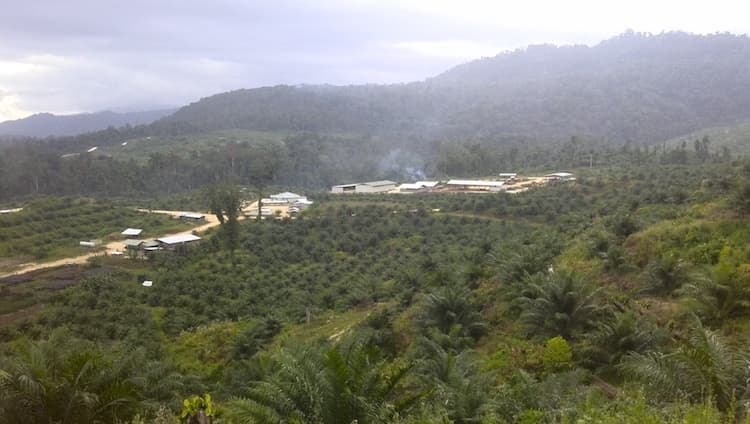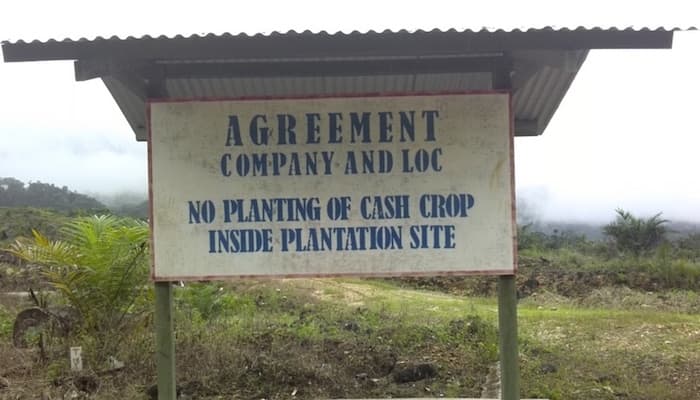Dirty SABL Palm Oil to hit the International Market

The oil palm mill at Dirina in Pomio
SABL Story Project*
Who would think that a responsible government, whose income is dependent on tax revenue would allow one of our major export crop to be smeared with more dirt?
Turning a blind eye to rogue oil palm planters and milling companies could have serious economic consequences for the whole palm oil industry in PNG as the international market is currently particularly sensitive to allegations of human rights abuses, land grabbing, illegal logging and poor environmental standards.
Kanawi Pouru, former Managing Director of the PNG Forest Authority and now consultant with Rimbunan Hijau (RH) and its subsidiary company Gilford, has told local people in Pomio, the company is set to open its oil palm mill at Dirina. But where will RH find a buyer willing to take this dirty oil?
As part of one of the worlds largest and most controversial land grabs, RH has ventured into planting oil palm on customary land that has been taken from landholders using unlawful SABL leases.
To compound the problems, there are claims of widespread human rights abuses, disregard for local customs and breaches of international conventions and national laws.
There are at least four legal cases currently before the courts disputing RH’s claims to the customary land in Pomio on which it is bulldozing its so called “development”.
To date Gilford says it has planted 10,000 hectares of oil palm in the three of the four SABL concessions that make up the amalgamated West Pomio Oil Palm project. Pomata, Ralopa and Nakiura have 5,000ha, 3,000ha and 2,000 hectares respectively.
Gilford says it plans to plant up to 34,000 hectares in total but blames the various court cases for the slowing progress. RH says it aims to plant a further 4,000 hectares in the Unung-Sigite concession which has yet to suffer any logging and where landholders are standing firm against the logging company.
The plantations have already displaced at least 10 villages with hundreds of households forced to move with no proper plans for their resettlement, leaving them with no choice but to be employed as labourers on their own land.
In Pomata and Marana, which sit within the SABL boundaries, the inhabitants have been restricted from any alternative form of land use for commercial purposes. Clearly displayed signs have been erected in various parts of the SABL carrying the words “Agreement with LOC, No Planting of Cash Crops”.

In Pomio food staples like Cassava and Bananas are being classified as ‘cash crops’
Although the company claims there are reserved parcels of customary land for use by local people for shifting cultivation, the landholders are restricted from planting many food staples and cash crops to sell that can generate an alternative income. The restriction is closely enforced by armed policemen from the Royal PNG Constabulary, dubbed locally as the “company police.” The restriction has impoverished the landholders to a point where a young man pointed out that he would have little choice but to turn to crime to fend for his family in future.
“The last thing I will do is be a slave on my own land and since I cannot be allowed to plant crops that will earn me an income or for domestic consumption I will have no choice but to employ illegal means to ensure my family doesn’t starve.”
This young man and many others are facing a gloomy future.
A local woman said:
“when we planted cassava, taro, banana and sweet potatoes we were ordered to strip these as well by RH’s police. We are not allowed to replant our existing cash crops because we are told that the company will need the land for more oil palm.”
The wages paid by the company could never support anyone who doesn’t have a food garden to supplement their diet. The plantation is using a labour supply system where the work is outsourced to what are being termed ‘Head Gangs’ who then agree with individuals what they want to be paid for their labour. According to the workers interviewed some receive as little as K20 a fortnight while some receive up to K300.
Where then will Gilford sell the Crude Palm Oil (CPO) from its Dirina mill if the market is tightly controlled as demanded by international agreements and foreign buyers?
Will it end up on the black market, where lower prices will affect profitability, or are there markets where buyers are not concerned about environmental and human rights standards?
Will the PNG Palm Oil Council step in to try and ensure that PNGs reputation is not further smeared by dirty oil?
The local people are being made beggars and slaves on their own land. The environmental services the forest used to provide have been bulldozed as the forest has been cleared. The financial returns to the landholders are negligible and any monies are sucked up and disappear into the pockets of local Landowner Company executives..
* The 'SABL Story Project' is an initiative of ACT NOW! that gives a voice to people in remote rural areas whose lives are impacted by the SABL land grab but who do not have access to the media to tell their stories.
